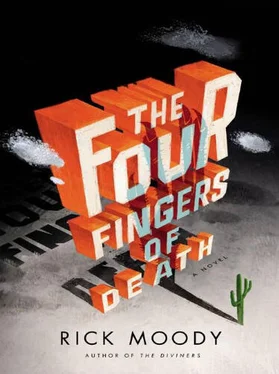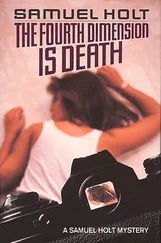“They love that the arm moves and halts and wiggles its digits. This just makes the cats want to use their very primitive hunting instincts on the arm, and so the cats begin tearing into the meat on the arm, and it’s almost as if the film used genuine feral cats for this sequence, hungry ones, because they really fight with one another, and they really struggle to get the upper hand , so to speak. Maybe they glued some meat onto the rubberized arm, some tuna, for the cats to fight over.”
“Monty, I know this is important—”
“One more second, I have something to give you, but let me tell you about this last little bit, and then I will…”
His turn to sigh, a purely theatrical sigh — the one entitled Prima Donna .
“Why are the cats in the sequence? The next-to-last sequence in the film? Theoretically, we are only interested in the human characters. Right? We’re interested in Paul, and we’re interested in whether he’s going to recover fully from the affliction that has beset him. Why the cats? Are they meant to indicate that the infection from the arm is now loosed on the natural world? This reminds me—”
I began to warm to a subject that was important to me, namely the rivers of gore subgenre of horror films, so popular in the new millennium. Suddenly the only films that teenagers would pay to download were films that had bodies exploding everywhere, or various infections destroying various parts of bodies, and then there were zombies, no end of zombies, zombies chewing on other people’s bodies, zombies, zombies, zombies, and blood everywhere. Bodies profaned by cinema, disassembled, reassembled, augmented, sundered, and with blood on everything, like the gastronomic drizzle of nouvelle cuisine. It must have been, I told Tyrone, that the one business sector in the battered economy that still had earnings potential was the manufacture of theatrical blood , right? People were breaststroking in the stuff, and they were reaching out to grab lengths of intestine, trying to yank themselves out of the rivers of gore with the length of intestine, and they were using severed heads as footstools, all that kind of stuff. It was horrible, I told Tyrone. How much sweeter and gentler were the heavily symbolic films of the drive-ins, with their silly conceits and affectations, I Was a Teenage Werewolf and Creature from the Black Lagoon . The cats, I meant to say, were precursors of the rivers of gore imagery that was so essential in The Four Fingers of Death , namely the film, the remake, that I was soon going to undertake to novelize.
“Listen, Monty, I’m going to leave.”
“Wait, wait. Let me just give you this.” And then it was that I reached into my pocket, my breast pocket, because I was wearing an old thrift store jacket, because I wanted to look reasonably elegant on such a day, and in the pocket of my old thrift store jacket, in a wax paper envelope, was, as you would have guessed, a McClintock original issue baseball card. Signed. As I have said, I had more than one. I managed to acquire a great wealth of them, and with these I financed a number of things in life, the down payment on our house, my wife’s surgery, some of my publications. I was down to four of the cards, before this day. This made it three.
You wouldn’t have believed the look etched on Tyrone’s face! He had expected no such thing. He had confronted the fact that he lost the contest fair and square. And giving him the card, of course, contradicted my very belief system! There were principles in the fetishistic world of collectibles. Things were worth what they were worth, and you needed to abide by prices and values. It was not wise to go allowing emotion to rule my business transactions. Normally, I adhered to these rules.
“My God,” Tyrone whispered, gazing on the card. “I’ve never actually seen one. He really was a handsome guy. And you really can’t see the arm at all.”
“I don’t approve of them covering up the arm. I think people should see the arm.”
With a mute satisfaction, we both gazed at the picture of McClintock.
Tyrone said, “Are you sure? This is really generous of you. And unexpected. I’m tempted to refuse, you know, but then something in me just doesn’t want to refuse.” He smiled. Not an easy smile. Not an uncomplicated smile. “And now I really do have to go get on the plane.”
I said, “I know you do.”
There was some settling up, and this was methodical. Two men who were not without respect for each other but who were otherwise not close. The time of their acquaintance was over. Tyrone muttered something conciliatory as he figured a tip, but by then I was distracted myself. I stood. I shook his hand; he heaved his overnight bag up onto his shoulder, and he turned and made for the door.
Try and raise
The county coroner
And then call my wife—
I’m liable
To be up all night.
It is true , readers of my afterword, that I had not told Tyrone that I’d just lost my wife, Tara Schott Crandall. Not one week before. You may wonder why I didn’t tell him. I didn’t tell him about my loss, though I had meant to find a time to do so. But then it became impossible to remedy my silence. Now I will tell you, instead, because it’s important to tell someone about it. Had she not passed away, it is possible that I would never have completed the chess game with Tyrone. Nor would I have attempted to write the novelization of The Four Fingers of Death , nor would I have felt as I feel now in this mitigated night of my middle age.
It is true that there is a consciousness of things, and then there is the unconsciousness of things, and generally we recognize that these are the two ways of living in the world. We think of consciousness as the essential prerequisite of daily life, enabling us to do what needs to be done, to negotiate the paperwork, to heat the hot water, to recycle the recyclables, to julienne the vegetables, but in fact we spend much less time conscious than we think we do, and this I know now from the weeks in which Tara’s new lungs began to succumb to their fungal infection, and she began to get sicker and sicker. What I mean is that my attempts to stay awake and alert throughout her illness were marred by my own eruptions of unconsciousness. I tried to stay awake through nights, so that I could watch her as she slept, as she kicked off the sheets and blankets again, so that I could say to her such sentimental things as she wouldn’t tolerate when awake; for example, I reiterated that I had mostly floundered in life, didn’t consider myself very good at life, until I’d met her, when she came to sit in on my writing class, and though — I said to her — I didn’t immediately apprehend, back when she audited, that she was going to be the reinforced shipping container of my future, containing every good thing that would happen for the next years, I did recognize the fluttering in my heart, as I ought to have, because I am just smart enough to be able to identify the advent of affection, I told Tara. I had come to know, I told her, that I was a man of some delusion and some inability to assess dew points and leading economic indicators of the heart, but, I told her, I did better in this case because of her, and it was perhaps true, as I held her hand in mine, and she stirred briefly, that she didn’t really want the responsibility of making me a better man, I was one , and this was not to be construed as requiring obligation on her part, unless she counted the obligation of accepting my gratitude. I should have known when she came into the class that something was bound to change in me, a selfish and preoccupied guy who taught the class mainly for the cold, hard green , though the money wasn’t great, and the students worse, and I was about to finish this thought when I found that, indeed, the distractions of exhaustion could overtake even myself. There was only so long I could sit up with her, so many days and nights.
Читать дальше












